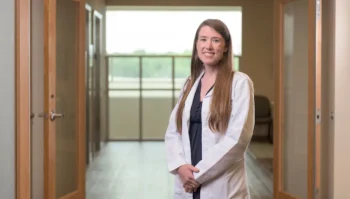Texas A&M School Of Medicine Expands Mental And Behavioral Health Training

The Texas A&M University School of Medicine is ramping up mental and behavioral health training for primary care physicians. Through a recently awarded $2.4 million grant from the Health Resources and Services Administration (HRSA), the Integrated Behavioral Health Program in the school’s Department of Primary Care and Rural Medicine is broadening and deepening its current family medicine residency training program for both residents and faculty.
The additional funding will allow the program to expand clinical and didactic mental and behavioral health training that will better equip family medicine physicians to care for pediatric, adolescent and young adult populations in underserved areas. Success of the project will be evaluated by the Texas A&M School of Public Health.
Texas is ranked 46th out of 50 U.S. states and the District of Columbia when it comes to adult access to mental health and behavioral health services. Of our 254 counties, 214 are designated as full or partial Health Professional Shortage Areas for Mental Health and only 36 percent of the need for mental health professionals in Texas is currently met. As a result of this shortage, more than 63 percent of adults with mental health issues in Texas did not receive treatment in 2020, and three-quarters of Texas youth with depression went untreated. What’s more, only 13 percent of children and youth of color receive treatment for mental health needs as compared to 31 percent of their white peers.
The critical shortage of trained mental health providers in Texas, combined with long-standing stigma surrounding seeking mental health treatment, means primary care providers, including family medicine physicians, frequently serve as the only mental health resource for many patients. Unfortunately, family medicine physicians do not receive standardized training in mental and behavioral health during their residency, leading to less-than-ideal patient care.
“This grant will extend the training of primary care providers for identifying and treating mental health conditions within underserved and rural medical settings where there is limited specialty mental health support,” said Meredith Williamson, director of Behavioral Health and Wellness in the School of Medicine Family Medicine Residency Program. “This program will also prepare them to collaborate as partners in interdisciplinary teams with other professions including the mental health specialties of social work, psychology and psychiatry to take care of all of individuals’ health care needs as one team in one setting.”
Although other medical schools provide integrated behavioral health training within primary care settings, the program offered at Texas A&M is unique. Family medicine residents at Texas A&M work in an integrated behavioral health consultation clinic at Texas A&M Health Family Care, where they’re part of an interdisciplinary team of primary care medical providers working lockstep with numerous mental health disciplines including psychiatry residents, psychology doctoral students, and social work students. All learners are also trained to provide hybrid (in person and telehealth) clinical services with both medication management and counseling interventions.
“Our ultimate goal with this program is to increase access and cost effectiveness of mental health treatment while decreasing stigma of seeking mental health treatment,” Williamson said. “We also aim to increase knowledge and skills of medical professionals to identify and intervene for whole-person health care instead of separating mental and physical health care.”
“A lot of mental health concerns present early,” said Whitney Garney, associate professor in the School of Public Health’s Department of Health Behavior and lead on evaluating the project. “Typically, those individuals wait at least 10 years to receive treatment. If these mental issues can be identified early in their development, and we get them into treatment, there is a dramatic change over their lifespan and how they can cope with difference problem situations and issues related to behavioral health.”
The Integrated Behavioral Health Program within the Texas A&M Health Family Care clinics and Department of Primary Care and Rural Medicine is the only fully integrated behavioral health program in the Brazos Valley providing training to both medical and behavioral health professionals in the same setting. Since its inception in 2018, the program has offered comprehensive behavioral health services, including assessment and intervention, to more than 1,000 unique underserved patients. In the past year alone, the program has seen more than 1,500 patient visits for mental health concerns within primary care. With the additional funding from HRSA, this impact is expected to grow exponentially.
This article by Lindsey Hendrix originally appeared on Vital Record.





